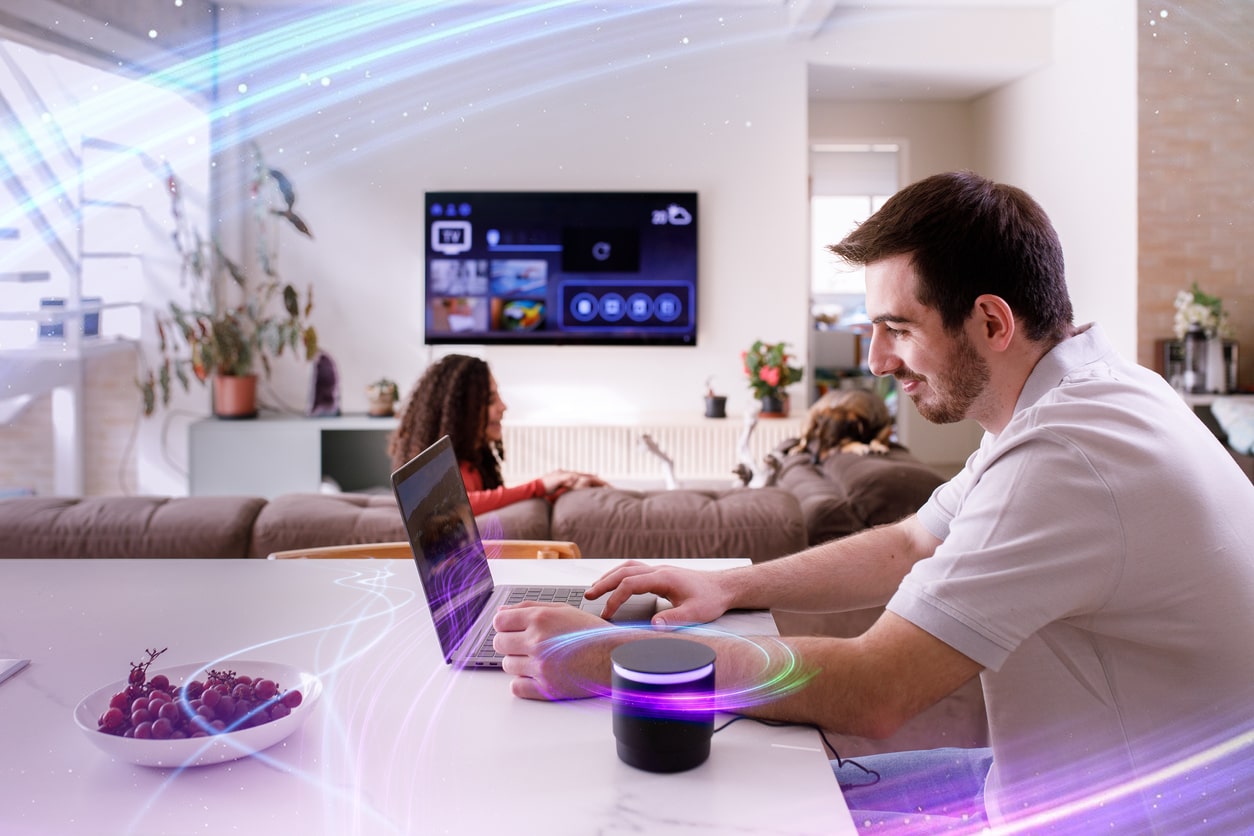AI Parenting: Benefits and Risks of AI for Families and Childcare

For many of us, artificial intelligence (AI) sounds like something from a science fiction movie or a scary robot that wants to become human. However, AI has been around for years and isn’t as cutting-edge as it seems.
As parents, we may be skeptical of AI’s impact on family life. Will this globally trending tool start to affect our daily lives? How will it impact our children’s mental health and emotional intelligence as they grow?
We’ve turned to an expert to discover the potential risks and benefits of using AI in the home, tips for talking to kids about AI technology, and even advice on how AI can help with the mental load of parenting!
Meet the Expert: Yoky Matsuoka
FamilyEducation spoke with Yoky Matsuoka, a mom of four, tech CEO and MacArthur Genius Award winner for her work in AI. Yoky is the Founder & CEO of Yohana, an independently-led subsidiary of Panasonic focused on building consumer technology products and services to help people live healthier and happier lives.
As an accomplished executive and technologist, Matsuoka brings more than two decades of leadership experience to her role where she also leads global innovation and serves as the Managing Executive Officer of Panasonic Corporation.
Prior to Yohana, Matsuoka brought her distinct approach to human-centric design to leading Tech Giants. Most recently as a Vice President at Google’s Healthcare organization, and before that as Chief Technology Officer at Nest. Prior to Nest, she was head of innovation and co-founder of Google X, the company’s research and development lab. She has also served in a senior executive role at Apple and was Chief Executive Officer of Quanttus, a wearable health technology startup.
So, What Actually is Artificial Intelligence?

Artificial Intelligence (AI) refers to the development of computer systems that can perform tasks that typically require human intelligence. These tasks include things like visual perception, speech recognition, decision-making, and language translation.
In layman’s terms, AI is about creating machines that can think and learn like humans. It enables them to solve problems, make decisions and adapt to different situations.
AI tools involve the use of algorithms, data and computational power to simulate human intelligence and improve the efficiency of various processes. AI has applications in a range of fields, from self-driving cars to virtual assistants, and it continues to advance rapidly.
Can AI Help With the Mental Load of Parenting?
Yes, AI can have a positive impact on family life. When we think about our current home, there are probably some parts of our day where we are using AI technology without even knowing it.
“Many people have the conception that AI is a human-like robot or a scary futuristic computer, but most people probably already have AI in their household and don’t even realize it. Any everyday object or appliance labeled 'SMART' has a layer of AI or machine learning connected to the Internet of Things,” explains Yoky.
Here are some examples of where AI tools can assist with the mental load of parenting...
Scheduling and Reminders
AI-powered calendar apps and smart home devices can help parents keep track of appointments, school events, and other commitments. They can send reminders and even suggest optimal times for scheduling activities.
Meal Planning and Grocery Shopping
AI-driven apps can create meal plans based on dietary preferences and restrictions. They can also generate shopping lists, making it easier for parents to plan and shop for meals.
Educational Support
AI-based educational apps can provide personalized learning experiences for children, adapting to their individual needs and progress. These apps can also offer insights to parents about their child’s strengths and areas that may need more attention.
Virtual Assistants for Questions
Voice-activated virtual assistants can provide quick answers to a child’s questions, reducing the burden on parents to be a constant source of information. They can also engage children in educational conversations.
Health Monitoring
Wearable devices and health apps powered by AI can help parents monitor their child’s health, track developmental milestones, and receive alerts for any concerning changes.
Home Automation
Smart home systems with AI capabilities can automate tasks like adjusting the thermostat, turning lights on and off, or even managing security. This can make the home environment more efficient and comfortable.
Parental Controls
AI-driven parental control apps can help parents manage and monitor their children’s screen time, block inappropriate content, and set limits on device usage.
Emotional Support
AI chatbots and apps can provide emotional support and resources for parents, offering tips on managing stress, dealing with parenting challenges and promoting mental health and well-being.
Remember that while AI parenting can offer help with these tasks, its purpose is not to replace the crucial role that we play in our children’s lives.
Potential Benefits and Risks of Using AI in the Household
It’s important to carefully balance the benefits and risks of AI based on your family’s needs and ethical concerns.

Benefits of Using AI in the Household
There are potential benefits of using Artificial Intelligence in the household. Some examples that Yoky shares include saving energy and money on your heating/cooling bill, getting help with your grocery list from a smart refrigerator and tidying from a robot vacuum.
“AI has so much potential to get even better and smarter when it comes to taking care of people in their homes, especially when AI is backed by humans,” says Yoky.
Other benefits include the following:
- Convenience: AI-powered devices and systems can automate various tasks, making daily life more convenient. This includes things like smart thermostats, lighting systems, and voice-activated assistants.
- Efficiency: AI can optimize energy use, manage schedules and even learn user preferences over time, making household operations more efficient.
- Entertainment: AI-driven entertainment systems can recommend movies, music and other content based on individual preferences, customizing the overall entertainment experience.
- Security: AI-powered security systems can offer advanced features like facial recognition, monitoring and alerts, enhancing the safety of the household.
Risks of Using AI in the Households
As with any advanced technology, Artificial Intelligence comes with risks. Yoky shares that one of the main risks is protecting your data as a consumer. AI devices often collect and process data, raising concerns about user privacy. It’s crucial to understand how data is used and stored by these devices before you decide to purchase one.
Other risks to using AI in the household include the following:
- Security Vulnerabilities: As with any technology, AI systems can be vulnerable to hacking or misuse, potentially compromising sensitive information.
- Job Displacement: In some cases, the integration of AI in households may contribute to job displacement, particularly in industries where automation becomes prevalent.
- Dependency: Overreliance on AI for daily tasks might lead to a loss of certain skills or a sense of disconnection from manual processes.
- Cost: AI-powered devices can be expensive, and the cost of maintenance or repair may also be higher than traditional alternatives.
“As long as AI-powered products that are built for the home are keeping humans in the loop, we have more potential for AI helping than hurting from a smart home perspective,” adds Yoky.
Tips for Parents on How to Talk to Kids About AI Technology

Talking to kids about AI technology is important to help them understand its role in their lives. Yoky truly believes that in the future if you are not an AI user or AI creator, it will be harder and harder to get a job— not only in our kids’ generation but in ours as well. So we all need some basic level of understanding to do or create something meaningful with it
Here are some tips for parents on how to talk to their kids about AI technology:
Start with the Basics
Begin by explaining what AI stands for (Artificial Intelligence) in simple terms. Use age-appropriate language to convey the concept. For younger kids, you might use simpler explanations, analogies or stories to make it more relatable. For teenagers, you can have a more complex discussion.
Stay Informed Together
Keep up with technological advancements together. This shared learning experience can strengthen your bond and keep communication open.
“When talking to my kids about tech, [it helps] to approach the conversation from a place of relatability and openness. AI is an aspect of technology that will have a big influence on the lives of our children…I’ve found that an honest and open two-way conversation is very important with most things in parenting, and technology is no exception,” advises Yoky.
Encourage Curiosity
Yoky shared that AI is a polarizing topic. Depending on who you ask, it is the scariest thing ever or the best thing. In her opinion, neither is fully correct. Instead, it’s important to foster a sense of curiosity by encouraging questions about AI. Answer your child’s questions or explore together to find the answers.
“[AI] has the potential to help and it also has a potential to harm, but one thing we should all agree on is that AI is here to stay and is not going anywhere. We all need to learn how to live with AI and how to do it in a way that is healthy and can enhance our lives and well-being, not the other way around,” explains Yoky
Emphasize Assistance, Not Replacement
Clarify that AI is designed to assist and make certain tasks easier but doesn’t replace human intelligence or emotions. Give examples of how AI is used, such as voice-activated assistants or recommendation algorithms.
Address Privacy, Security and Ethical Concerns
Discuss the importance of privacy and explain that some AI devices might collect data. Teach them about the importance of not sharing personal information with AI devices or online platforms.
Talk about the ethical use of AI and the responsibility of creators to ensure fairness and inclusivity in AI systems. Discuss the importance of using technology in ways that benefit everyone.
Highlight the Positive Aspects
Share examples of how AI is used for positive purposes, such as in education, healthcare or environmental conservation. Emphasize how AI can be a tool for solving complex problems.
Hands-On Learning
Rather than being scared or waiting for someone else to tell us what to do with it in their own home, Yoky advises that we should embrace it and learn it on our own.
Allow kids to interact with AI devices under supervision. This hands-on experience can demystify the technology and make it less intimidating.
“Start by inquiring how kids are using AI to do their homework and how it could actually help enhance their schoolwork. Some schools are starting to use ChatGPT and other generative AI programs in the classroom, just like calculators were used back in our day. I think the answer here is to not be scared by it and just remember that we are all learning as we go,” advises Yoky.
Model Healthy Technology Use Habits
Demonstrate responsible technology use. This includes setting limits on screen time, respecting privacy and using AI devices mindfully. Yoky explains that as parents, we are responsible for educating our children about technology and helping them navigate the role that it has in our lives. This starts by talking to them about technology and looking at our own relationship with it.
“I share my own struggles with disconnecting and apologize [to my children] if I haven’t been present when I should have been. I acknowledge when I’m feeling run down because I haven’t taken time to unplug. I also check in with my kids and ask what is happening on social media and how they are feeling,” shares Yoky.
Ultimately, AI is a form of technology that is here to stay and will evolve over time. It’s important to understand the risks and benefits of AI and start learning more about it so that we feel comfortable using and talking about it with our kids. An ongoing and open conversation with our kids will encourage them to discuss their concerns and questions about AI.

